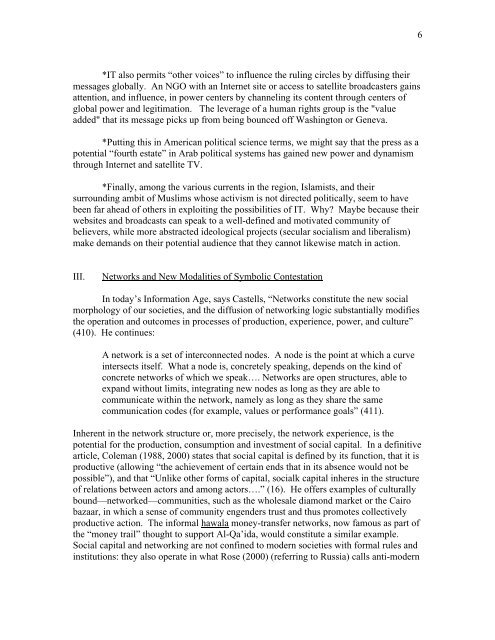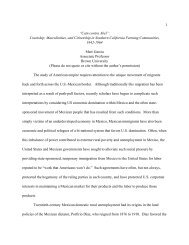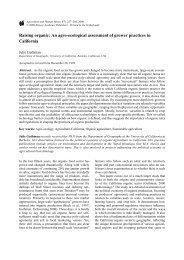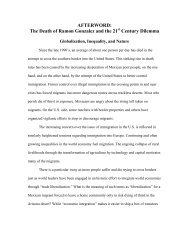DRAFT Please do not cite or publish without permission Information ...
DRAFT Please do not cite or publish without permission Information ...
DRAFT Please do not cite or publish without permission Information ...
You also want an ePaper? Increase the reach of your titles
YUMPU automatically turns print PDFs into web optimized ePapers that Google loves.
6<br />
*IT also permits “other voices” to influence the ruling circles by diffusing their<br />
messages globally. An NGO with an Internet site <strong>or</strong> access to satellite broadcasters gains<br />
attention, and influence, in power centers by channeling its content through centers of<br />
global power and legitimation. The leverage of a human rights group is the "value<br />
added" that its message picks up from being bounced off Washington <strong>or</strong> Geneva.<br />
*Putting this in American political science terms, we might say that the press as a<br />
potential “fourth estate” in Arab political systems has gained new power and dynamism<br />
through Internet and satellite TV.<br />
*Finally, among the various currents in the region, Islamists, and their<br />
surrounding ambit of Muslims whose activism is <strong>not</strong> directed politically, seem to have<br />
been far ahead of others in exploiting the possibilities of IT. Why Maybe because their<br />
websites and broadcasts can speak to a well-defined and motivated community of<br />
believers, while m<strong>or</strong>e abstracted ideological projects (secular socialism and liberalism)<br />
make demands on their potential audience that they can<strong>not</strong> likewise match in action.<br />
III.<br />
Netw<strong>or</strong>ks and New Modalities of Symbolic Contestation<br />
In today’s Inf<strong>or</strong>mation Age, says Castells, “Netw<strong>or</strong>ks constitute the new social<br />
m<strong>or</strong>phology of our societies, and the diffusion of netw<strong>or</strong>king logic substantially modifies<br />
the operation and outcomes in processes of production, experience, power, and culture”<br />
(410). He continues:<br />
A netw<strong>or</strong>k is a set of interconnected nodes. A node is the point at which a curve<br />
intersects itself. What a node is, concretely speaking, depends on the kind of<br />
concrete netw<strong>or</strong>ks of which we speak…. Netw<strong>or</strong>ks are open structures, able to<br />
expand <strong>without</strong> limits, integrating new nodes as long as they are able to<br />
communicate within the netw<strong>or</strong>k, namely as long as they share the same<br />
communication codes (f<strong>or</strong> example, values <strong>or</strong> perf<strong>or</strong>mance goals” (411).<br />
Inherent in the netw<strong>or</strong>k structure <strong>or</strong>, m<strong>or</strong>e precisely, the netw<strong>or</strong>k experience, is the<br />
potential f<strong>or</strong> the production, consumption and investment of social capital. In a definitive<br />
article, Coleman (1988, 2000) states that social capital is defined by its function, that it is<br />
productive (allowing “the achievement of certain ends that in its absence would <strong>not</strong> be<br />
possible”), and that “Unlike other f<strong>or</strong>ms of capital, socialk capital inheres in the structure<br />
of relations between act<strong>or</strong>s and among act<strong>or</strong>s….” (16). He offers examples of culturally<br />
bound—netw<strong>or</strong>ked—communities, such as the wholesale diamond market <strong>or</strong> the Cairo<br />
bazaar, in which a sense of community engenders trust and thus promotes collectively<br />
productive action. The inf<strong>or</strong>mal hawala money-transfer netw<strong>or</strong>ks, now famous as part of<br />
the “money trail” thought to supp<strong>or</strong>t Al-Qa’ida, would constitute a similar example.<br />
Social capital and netw<strong>or</strong>king are <strong>not</strong> confined to modern societies with f<strong>or</strong>mal rules and<br />
institutions: they also operate in what Rose (2000) (referring to Russia) calls anti-modern





